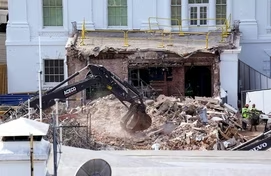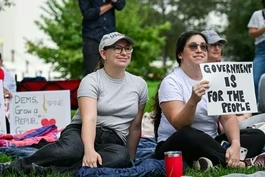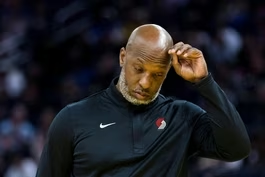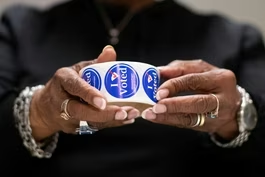
Epstein survivor's memoir exposes abuse by powerful men
Clip: 10/23/2025 | 12m 47sVideo has Closed Captions
Epstein survivor Virginia Giuffre’s posthumous memoir exposes abuse by powerful men
A new book tells the story of Virginia Roberts Giuffre, one of many victims of sex trafficker Jeffrey Epstein. Giuffre died by suicide earlier this year. Her posthumous memoir explores her resilience while also revealing new details about the abuse she suffered at the hands of powerful figures. Amna Nawaz has that story. And a warning, this report includes accounts of sexual abuse and suicide.
Problems playing video? | Closed Captioning Feedback
Problems playing video? | Closed Captioning Feedback
Major corporate funding for the PBS News Hour is provided by BDO, BNSF, Consumer Cellular, American Cruise Lines, and Raymond James. Funding for the PBS NewsHour Weekend is provided by...

Epstein survivor's memoir exposes abuse by powerful men
Clip: 10/23/2025 | 12m 47sVideo has Closed Captions
A new book tells the story of Virginia Roberts Giuffre, one of many victims of sex trafficker Jeffrey Epstein. Giuffre died by suicide earlier this year. Her posthumous memoir explores her resilience while also revealing new details about the abuse she suffered at the hands of powerful figures. Amna Nawaz has that story. And a warning, this report includes accounts of sexual abuse and suicide.
Problems playing video? | Closed Captioning Feedback
How to Watch PBS News Hour
PBS News Hour is available to stream on pbs.org and the free PBS App, available on iPhone, Apple TV, Android TV, Android smartphones, Amazon Fire TV, Amazon Fire Tablet, Roku, Samsung Smart TV, and Vizio.
Providing Support for PBS.org
Learn Moreabout PBS online sponsorshipGEOFF BENNETT: A new book out this week tells the story of the late Virginia Roberts Giuffre, one of the many victims of the late sex trafficker Jeffrey Epstein.
Giuffre took her own life earlier this year.
Her posthumous memoir explores her resilience, while also revealing new details about the abuse she suffered at the hands of powerful figures, as well as newly surfaced allegations of mistreatment by her husband.
Amna Nawaz has that story.
And a warning: This report includes accounts of sexual abuse and suicide.
AMNA NAWAZ: Most of the world came to know Virginia Roberts Giuffre in 2011, when she began speaking out about the abuse she endured at the hands of some of the world's most powerful men.
In court filings, Giuffre described being sexually abused and trafficked by Jeffrey Epstein when she was as young as 16 years old.
She accused Epstein's co-conspirator, Ghislaine Maxwell, of luring her into that world from Mar-a-Lago, where she worked as a locker room attendant at the spa.
Epstein was arrested on sex trafficking charges in 2019, but died by suicide in his jail cell in August that same year while awaiting trial.
Giuffre spoke after his death, continuing to demand justice.
VIRGINIA ROBERTS GIUFFRE, Jeffrey Epstein Survivor: I want to start by saying it's not how Jeffrey died, but it's how he lived.
And we need to get to the bottom of everybody who was involved with that, starting with Ghislaine Maxwell and going along the lines there.
I was recruited at a very young age from Mar-a-Lago and entrapped in a world that I didn't understand.
And I have been fighting that very world to this day, and I won't stop fighting.
I will never be silenced until these people are brought to justice.
AMNA NAWAZ: Giuffre led the way for many more women to come forward about their own abuse by Epstein and those around him.
In April of this year, Giuffre died by suicide in Australia, where she lived for many years with her husband and three children.
She was just 41 years old.
Giuffre's story is told now in a new posthumous memoir titled "Nobody's Girl: A Memoir of Surviving Abuse and Fighting for Justice," a collaboration with journalist Amy Wallace.
And she joins me now.
So you spent four years working closely with Virginia on this book.
Why did she want to write it?
What's the message she wanted to send with this?
AMY WALLACE, Co-Author, "Nobody's Girl: A Memoir of Surviving Abuse and Fighting for Justice": Well, she was really clear about her main reason for writing it, which is that she wanted to help other survivors of sexual abuse, not just Epstein and Maxwell survivors, but anyone who's been coerced into sex against their will.
And so she wanted to depict herself sort of warts and all, highs and lows.
AMNA NAWAZ: It's an absolutely unflinching and haunting account of what she lived through, especially her years as a child, I think detailing all of the sexual abuse she went through at the hands of her own father, which he denies, being trafficked to her father's friend, which she details being raped by two teenagers later, by strangers after she runs away first from her own home and then from an abusive group home, all before she was even 16 years old.
What was it like for her to relive all of those moments and retell them to you?
AMY WALLACE: Well, it was obviously very difficult.
There was a decision she had to make.
In the past, she had always said truthfully, I was abused in my childhood by a family friend.
That was true.
And that person is in the book.
But what she hadn't said was she was also abused by her own father.
And that was a decision that she made to decide to go there.
Sort of the precipitating event is this idea that victims of sexual trafficking are not born.
They are made, and they are made through terrible experience.
And so she would say to me: "How can I go after or try to point the finger at all of these men I have been trafficked to, boldfaced names, when I won't even talk about the person who originally hurt me?"
And who arguably made her more vulnerable to being hurt throughout her life, because she had had these early experiences.
It was painful, but it was -- she felt like it was necessary.
AMNA NAWAZ: You know, she's allegedly being abused by her own father and she tries to tell other people about it.
They're at a family excursion on a big family camping trip.
And in front of extended family, she confronts her father about this.
She says what he's been doing, and no one reacts.
In fact, her father actually takes her into the camper van and allegedly beats her inside there.
What did she take away from that moment?
Why did that stand out?
AMY WALLACE: When you grow up in a world where adult men rape children and nobody does anything about it, then you start to believe that's how the world actually is.
So the thought of escaping from Epstein's Manhattan townhouse and -- she didn't think the world outside was any different.
The world she had grown up in, that kept happening to her.
And so there was this psychic manipulation that we can talk about more in terms of what Epstein and Maxwell did to keep the girls close.
In Virginia's case, he threatened her with a picture of her beloved younger brother Sky and said: We know where he goes to school.
Here's a picture we took of him at school.
And if you ever turn on me, if you ever turn me in, we will hurt him.
So that was going to keep her in place.
AMNA NAWAZ: By the time she's 16, she's dropped out of high school.
She's working different retail jobs trying to make ends meet, living with a boyfriend that's not going anywhere, it sounds like.
And her father, I learned in the book, worked for Donald Trump at Mar-a-Lago as a maintenance man, gets her a job, an hourly job working as a locker room attendant at the spa.
She wants to go on to have a career as a massage therapist, right?
This is where she comes into contact with Ghislaine Maxwell and Jeffrey Epstein.
How do they bring her into their world?
AMY WALLACE: She thinks: Wow, this is a cool life.
Maybe I'd like to become a masseuse.
I don't know, but I don't know anything about it.
So she takes a book out of the library about anatomy.
And she's reading it at the front desk of the spa one day when it's a quiet moment.
And by the time Ghislaine gets there, she's reading this book.
You're so interested in anatomy?
Would you like to become a masseuse?
Are you a masseuse?
Well, I know a wealthy man.
He would love to train you.
Come today.
Come this very afternoon, and I will introduce you to him.
And that very day, she goes, and both Ghislaine Maxwell and Jeffrey Epstein sexually abuse her in the massage room.
AMNA NAWAZ: She goes on to be repeatedly abused by Epstein, by Maxwell, by a number of people in their circles.
She's named some of them before.
She's named Prince Andrew before, for sure.
She details multiple allegations here of his assaults against her.
And he has since been stripped of his royal title since the book came out and these details were revealed.
I have to wonder, has there ever been any legal accountability, any attempt at legal accountability with the people that she's named before and now in this book?
AMY WALLACE: Well, this is why everybody's clamoring for the Epstein files, what we are now calling the Epstein files.
I don't think anyone exactly knows how voluminous they are.
They may be 12 file cabinets.
They may have videotapes in them.
We're not totally sure.
But I know what Virginia told the FBI,and she did it repeatedly.
The allegations were made.
She's been deposed several times, and those depositions are public.
And there are many, many men named in those public depositions.
Not all of them are in the book, but the names are out there.
And, basically, what's happened so far is, those men have had their publicist issue statements saying, we deny it.
And that's as far as it's gone.
AMNA NAWAZ: Virginia documents in the book the details that Epstein saved, photos, videotapes, presumably lists and other documentation somewhere else.
Is it fair to assume all of this is in the hands of the authorities?
And in saying, release the Epstein files, what do you think would be learned from that?
AMY WALLACE: Well, I think there should be a trove of information.
We also know from Virginia's account that there were video cameras in that Manhattan townhouse in all of the private spaces, I believe even in the bathrooms.
So those videotapes would theoretically not just let you know the horrors that went on in the house, but they might even identify some of the men.
He was surprised when he was picked up at Teterboro Airport and arrested him.
They were also battering in the door and going into that Manhattan townhouse.
So that gives me hope that there were things that were confiscated from that house.
AMNA NAWAZ: In terms of what's known and unknown, she details what's probably one of her most brutal assaults ever, and she says that it happened at the hands of a powerful prime minister.
She says that she was choked and that she was beaten, bloodied, and it was a real turning point for her as well.
He's not named in the book.
I wonder why not and if there's any potential accountability there.
AMY WALLACE: It really, really mattered to hold these people accountable.
And so she came forward to the authorities, and they know those names.
And... AMNA NAWAZ: The authorities have the name of this prime minister?
AMY WALLACE: I believe so.
So, then the question is, if you're going to rename and rename and rename, you open yourself up to a bunch of dangers.
One, you lose your privacy, obviously.
That's a given.
She's already done that.
But this is a family that had death -- she had death threats against her.
She had her house broken into.
So there's a safety issue.
And with this particular gentleman, she was afraid he would kill her.
AMNA NAWAZ: She told you that?
AMY WALLACE: Absolutely.
AMNA NAWAZ: It is brutal to read these accounts in such detail and with such candor.
And she writes at one point straight to the reader: "I know this is a lot to take in, the violence, the neglect, the bad decisions, the self-harm.
Imagine if a trauma reel like this played in your head all the time, as it does mine, and not just on the pages of a book you can put down if you need to just for a moment to steady your nerves.
But, please, please," she writes, "don't stop reading."
Why was that important to include?
AMY WALLACE: She doesn't just break the fourth wall and say, come with me, keep going, now back to the traumas.
She takes you into a moment in her present.
And I think the moment in the book at that point is, she's in the car, she's playing all her music.
She's American, but her kids are Australian.
They grew up in Australia.
So she's playing all her music, which was a huge coping mechanism for her.
And they're teenagers and they're like, ah mom, your music is awful.
Turn it off.
And we capture that scene.
It gives you a little bit of hope, but also just a break before you go back into reading.
AMNA NAWAZ: Amy, she was only 41 when she took her own life just earlier this year.
What was going on in her marriage and in her world around that time?
What can you tell us that she told you?
AMY WALLACE: Well, she died in April, and a lot had happened in that time.
Her marriage had broken down.
They were estranged from each other.
There had been allegations back and forth, and her husband had won a restraining order against her, keeping her from seeing or communicating with her kids, which was very, very difficult for her.
AMNA NAWAZ: She's not here today to talk about her own story.
I know you're sitting here in her stead.
What do you think she would make of this day, when her entire story, all of these details, is out in the rest of the world?
What would she want to say?
AMY WALLACE: We say in the preface that she wrote me an e-mail, me and another person on our team, and said: "In the case of my passing, I want this book published, not just for me but for the other victims."
We need to speak up, not just victims but women and men who are concerned about what's going on in our culture.
The fetishization of young girls is alive and well.
But, yes, she should be sitting here, not me.
I'm her facilitator.
I'm her collaborator.
I was there to help her tell her story.
And this is her book, her story.
And I'm heartbroken that she's not here to enjoy, if that's the right word, the moment of having people really know all the things that happened.
AMNA NAWAZ: Amy Wallace, thank you so much for being here.
The book, again, is "Nobody's Girl: A Memoir of Surviving Abuse and Fighting for Justice."
The author is the late Virginia Roberts Giuffre.
Thank you.
AMY WALLACE: Thank you.
East Wing torn down as Trump clears space for his ballroom
Video has Closed Captions
Clip: 10/23/2025 | 6m 15s | East Wing of White House torn down as Trump clears space for his ballroom (6m 15s)
Federal workers to miss full paycheck as shutdown drags on
Video has Closed Captions
Clip: 10/23/2025 | 3m 31s | Federal workers set to miss full paycheck as government shutdown drags on (3m 31s)
NBA faces troubling gambling questions after arrests
Video has Closed Captions
Clip: 10/23/2025 | 7m | Arrests of current and former stars raise troubling gambling questions for NBA (7m)
Pennsylvania election official on DOJ's voter data lawsuit
Video has Closed Captions
Clip: 10/23/2025 | 7m 11s | Pennsylvania election official responds as DOJ sues state to obtain voter data (7m 11s)
Pentagon's attempt to ban books faces backlash from families
Video has Closed Captions
Clip: 10/23/2025 | 8m 1s | Pentagon's attempt to ban books from base schools faces backlash from military families (8m 1s)
Providing Support for PBS.org
Learn Moreabout PBS online sponsorship
- News and Public Affairs

FRONTLINE is investigative journalism that questions, explains and changes our world.

- News and Public Affairs

Amanpour and Company features conversations with leaders and decision makers.












Support for PBS provided by:
Major corporate funding for the PBS News Hour is provided by BDO, BNSF, Consumer Cellular, American Cruise Lines, and Raymond James. Funding for the PBS NewsHour Weekend is provided by...




